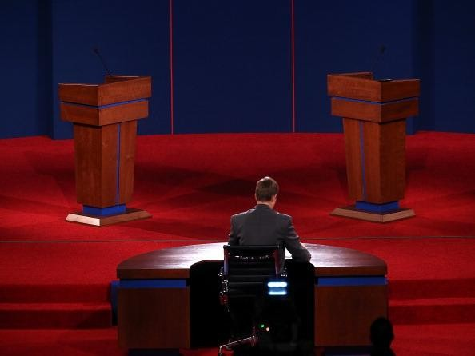The presidential debate offers a rare opportunity to rise above the usual campaign froth and spin. It’s a nationwide job interview where each participant will try to put their best foot forward without getting it anywhere near their mouth. It is not a cliché to call it a make-or-break moment.
It’s important for the candidates, too.
Let’s not kid ourselves. The debates are all about the moderators. Just ask them. A successful performance may result in the chance to host a prime time news show with infinitesimal ratings. Failure means pretty much the same thing.
So how will the moderators make it all about them? It’s tricky, as the candidates’ answers will take up much of their valuable time. Fortunately, there are as many strategies to get around this as there are environmentally friendly light bulbs above the moderator’s makeup mirror.
1. BE PROVOCATIVE. The best example of this was CNN’s Bernard Shaw’s famous opening question to Michael Dukakis in 1988: “Governor, if Kitty Dukakis were raped and murdered, would you favor an irrevocable death penalty for the killer?”
Dukakis’s answer was equally memorable: “No, Bernie — may I call you Bernie? — as you know, I do not favor the death penalty, even if it could be revoked by some kind of priest or exorcist. I’d be happy to have my campaign fax you a copy of my alphabetized list of positions on the issues; ‘death penalty’ comes right after ‘campaign finance reform’ and right before ‘deficits.'”
2. HELP THE CANDIDATE ALONG. Bernard Shaw failed to do this: “Gov. Dukakis, you clearly didn’t understand the purpose of my question. So I will ask you again. And this time, get mad! Moron.” But occasionally reporters have tried to nudge candidates away from untenable statements.
An example of this occurred during the second Ford-Carter debate in 1976. After President Ford said, “There is no Soviet domination of Eastern Europe and there never will be under a Ford Administration,” Max Frankel of the New York Times gave him a chance to correct himself. When Ford then donned a Russian ushanka and began singing the opening verse of the Soviet National Anthem, it was the beginning of the end for his re-election chances.
3. BE SMUG. This is not difficult for members of the fourth estate, as most J-schools require 12 credits of Smugness training to graduate. But most moderators try to keep their haughtiness under wraps.
An exception occurred in 1992, when ABC’s Carole Simpson repeatedly provoked third-party candidate H.Ross Perot: “Mr. Perot, everybody thought you won the first debate because you were plain-speaking and you made it sound oh so simple.” “Mr. Perot, you have an answer for everything, don’t you?” “Mr. Perot, can you wrap it up?” He answered back by stabbing her in the leg with a mechanical pencil, a notorious incident dubbed LeadGate.
4. LET YOUR BIAS SHOW. After Rep. Paul Ryan was named Gov. Romney’s running mate, CNN’s Candy Crowley said, “There is some trepidation [by Republicans] that this might be, looks a little bit like some sort of ticket death wish.” And CBS’s Bob Schieffer said of Ryan’s budget plan, “There’s some really tough stuff in there. I mean, he really slashes into social programs, and — I mean, it’s across the board.” Crowley will “moderate” the second presidential debate on Oct. 16, while Schieffer will “moderate” the final debate on Oct. 22.
5. IGNORE ISSUES THAT MATTER. On Oct. 12, 2000, terrorists bombed the U.S. Navy’s destroyer ship USS Cole while it was in port in Yemen. Seventeen American servicemen were killed. Five days later, Gov. George W. Bush and Vice President Al Gore met for their third and final debate, moderated by PBS’s Jim Lehrer. After the candidates expressed their sympathies for the fallen, the issue of terrorism was not brought up again, except for one cursory mention by Gore. Likewise, in the second presidential debate on Oct. 11 — also moderated by Lehrer — terrorism was never mentioned, even though the subject of the debate was foreign policy.
Jim Lehrer will have a chance to make amends, as he is moderating the first presidential debate of 2012. On a related note, there is no truth to the rumor that Lehrer holds incriminating photos of certain members of the Commission on Presidential Debates.
6. SPOUT PLATITUDES. This works best when placed in the context of “the American people.” “Mr. President, the American people hate negative ads, crave civility, and yearn for a time when Republicans and Democrats worked together to get things done for the American people. But all the American people see in Washington is partisan bickering caused by wealthy donors and narrow special interests. What do you have to say to the American people about this?” Feel free to use any of these terms in a debate drinking game.
7. TRY TO BE “HIP.” Expect at least one moderator to read a question posed on Facebook or Twitter to prove that they have this whole technology thing covered. Give them bonus points for using the word “blog.”
Any one of these strategies can help ensure a wholesome and predictable debate experience for the American people. But if a moderator needs further help, may I suggest an opening question:
John K. Herr is a Republican speechwriter and standup comic. He is the author of the forthcoming “Politics-to-English Dictionary.”

COMMENTS
Please let us know if you're having issues with commenting.